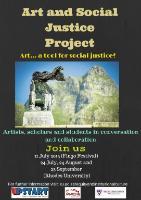
The Art and Social Justice/Social Cohesion Project places the role of art and visuality at the centre of a series of conversations about conditions of abjection and conflict that mark the post-apartheid. It is a response to two provocations: The “Reitz incident” that took place at the University of the Free State in 2008 which led to the founding of the University of the Free State’s Institute for Reconciliation and Social Justice (IRSJ) focussed on research related to race, reconciliation and social justice, and the public and institutional disputes over the Cecil John Rhodes statue in Cape Town in 2015 which were catalysed by students to draw attention to ongoing forms of racism and exclusionary practices at universities that cut across scholarship, administrative practice, architecture and place and its concomitant visuality.
Both the ‘Reitz’ incident at the University of Free State and contestations over the Rhodes statue at the University of Cape Town drew scholarly and public attention because of their visual and performative modalities. This has allowed for a return to the visual as a medium through which we may reflect on the post-apartheid present. Both events have catalysed conversations on the role of the university in relation to South Africa’s colonial and apartheid history and possible conjunctures in the present.
The project thus aims to extend such debates by considering art and visual culture as intervening or intermediary agents that allow for a foray into historical, social, geographic, theoretical and political arenas. It does so by drawing together three sites in Grahamstown that have taken up the task of art work in different forms: The Rhodes University School of Art, Upstart Youth Development Project and the Fingo Festival.
Established in 1928, the Rhodes University School of Art is the oldest art school in a university context in South Africa. By taking account of its location in an institutional setting whose existence was predicated on colonial governance and administration, the project aims to draw attention to how the school of art may be entangled with particular racial and other exclusionary formations in its pedagogy.
The Upstart Youth Development Project was established in 2008 as a project of inclusion. It was established “as initially…a youth newspaper conceptualised, written and compiled entirely by the youth members as a way of improving their reading, writing and communication skills” (see http://upstartydp.org/about/). Located in Ncame Street, Joza, its members are high school learners who are in grades 10 to 12 who are on the verge of entering higher education. Whilst the School of Art has the task of producing young artists and scholars, the Fingo Festival collaborates with existing artists living in Grahamstown. Located in Fingo, the Festival has been integral in extending and challenging the geography in which art is staged, from the centre of town to the Fingo township and its surrounds. Through such differentiated sites, the project hopes to open up a dialogue that interrogates the task of learning, art and visual culture and site-specificity with regards to the post-apartheid present. It does so with the intention of placing students, learners and artists at the centre of conversations through prioritising their views, experiences and reflections.
The main activities of the project are
1. three, two hour dialogues in which the relationship between art and social justice is discussed. Participants in these dialogues will be practising artists from the broader Grahamstown community, visiting artists from outside of Grahamstown, Rhodes University art students, other Rhodes University students whose studies align with the main goals and theme of the project, and students from Grahamstown’s high schools. The sub theme of each dialogue will be different and will be introduced by invited guest speakers.
Through the dialogues, the formation of partnerships and groups that will;
- produce art work that articulates themes of the project,
- write think pieces and papers on the key issues raised in the dialogues,
- write think pieces and papers that will critically reflect on the project’s processes of dialoguing and art production,
2. A colloquium at which the art work, the think pieces and papers produced as project outputs will be presented to a larger audience.
3. A book that will be a collection of think pieces, papers and photographs of the art work produced.
The dialogues will take place on the 11th of July, 24th of July and 24th of August 2015. The first dialogue will take place as part of the Fingo Festival Arts Festival programme. The colloquium will take place on the 25th of September 2015.
The project is funded by the Department of Arts and Culture through the University of the Free State Reconciliation and Social Justice Institute.
